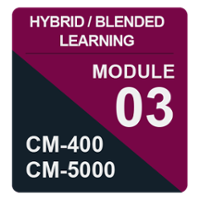![[Back to] What is BL-CM-5?](https://no-cache.hubspot.com/cta/default/3893111/6c825721-f9cd-4c36-8b72-b3fefb8c3cb1.png)
CM-5000 Crisis Management Expert Implementer Training Roadmap [Module] [Day] 3

Description of Module 3 Course
 Module [Day] 3 discusses the key roles and responsibilities of the Crisis Management Team (CMT) and the teams supporting the CMT.
Module [Day] 3 discusses the key roles and responsibilities of the Crisis Management Team (CMT) and the teams supporting the CMT.
It discusses the bidirectional flow of information to and from the CMT during the pre-crisis phase, focusing on prevention planning, crisis preparation, and crisis monitoring.
In this module, participants will be taught the crisis information flow and how mechanisms for detecting potential crises can be set up. Vital information is collected for assessment, processing, and dissemination during the onset of a crisis.
This lesson discusses crisis notification and escalation processes in depth. It concludes the discussion on crisis information flows by touching on post-crisis events and how information is used in the aftermath of a crisis.
 On top of that, it provides critical considerations for selecting and equipping a crisis command centre. A command centre's functions, types, characteristics and design principles are discussed.
On top of that, it provides critical considerations for selecting and equipping a crisis command centre. A command centre's functions, types, characteristics and design principles are discussed.
The importance of crisis communications is discussed alongside key concepts and terminologies. The lesson will also address interested parties and strategies to meet audience information needs. Media handling during a crisis and key considerations for crisis communication will be handled.
Students will be introduced to crisis leadership and its importance to success or failure in managing a crisis. The course is conducted in two 3-hour sessions, each lasting 2 hours, with one hour of pre-reading.
- Module 3 Session 1 [M3-S1] [Duration: 3-hour online workshop and 1-hour pre-reading]
- Module 3 Session 2 [M3-S2] [Duration: 3-hour online workshop and 1-hour pre-reading]
Detailed Course Content
| Topic | Description |
| [BL] Module 3 Session 1 - [HL] Morning Session | |
| Establish Crisis Management Team |
|
| Manage Crisis Flow of Event (Pre-crisis) |
|
| Manage Crisis Flow of Event (During Crisis) |
|
| Manage Crisis Flow of Event (Post Crisis) |
|
| [BL] Module 3 Session 2 - [HL] Afternoon Session | |
| Setup Command Centre Operations |
|
| Execute Crisis Communication |
|
| Manage Crisis Leadership |
|
| Maintain Training and Awareness |
|
Deliverables
- Able to project and program manage a CM programme
- Able to execute Crisis Communication

The following section applies to Singaporeans and Singapore permanent residents eligible for SkillsFuture Singapore (SSG) funding.
Click the button to find out more about the funding.
SkillsFuture Credit Claim [Initiative starting April 2020]
To claim SkillsFuture Credit (additional funding for Singaporeans), click the "SkillsFuture Credit Claimable" button to find out more from SkillsFuture Singapore (SSG).


![[BL-HL-CM-3-4-5] Phases Learning Roadmap CM-300-CM-400-CM-5000 Crisis Management Course Phase](https://no-cache.hubspot.com/cta/default/3893111/5ff26902-051e-4cf3-a8b2-ed16dc0af61b.png)



![[BL-CM] [5] Register](https://no-cache.hubspot.com/cta/default/3893111/82024308-16f4-4491-98be-818a882c6286.png)





![Email to Sales Team [BCM Institute]](https://no-cache.hubspot.com/cta/default/3893111/3c53daeb-2836-4843-b0e0-645baee2ab9e.png)


